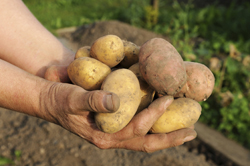Identifying nutrient-efficient crops
Including alternative land-management strategies, there have been other approaches to decreasing fertiliser use. But nutrient-use efficient (NUE) crop strains offer reduced fertiliser use while maintaining or even improving on current yields. The EU-funded NUE-CROPS(opens in new window) project is now developing the models, tools and knowledge required to breed and promote NUE crops. The aim is to introduce NUE varieties of wheat, oilseed rape, potato and maize, and the strains will be identified using genetic and physical testing. Laboratory and field tests have already identified potential NUE strains for all four crops, particularly in the area of nitrogen-use efficiency. Other work completed so far includes developing genetic databases of potential markers, and modelling to find the best combinations of NUE traits. NUE-CROPS will confirm the most promising NUE genetic markers, and it will apply further modelling and life-cycle analysis to optimise the benefits to be gained from new strains. In the long-term, the NUE-CROPS team's efforts will bring about benefits for the environment, farmers and consumers.



